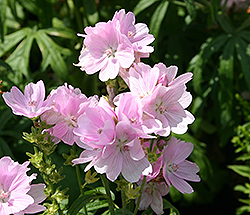Little Princess Prairie Mallow
Sidalcea 'Little Princess'
Height: 18 inches
Spacing: 14 inches
Sunlight:
![]()
![]()
Hardiness Zone: 4
Other Names: Checker Mallow
Ornamental Features
Little Princess Prairie Mallow has masses of beautiful spikes of shell pink round flowers rising above the foliage from early to mid summer, which are most effective when planted in groupings. The flowers are excellent for cutting. Its round leaves remain green in color throughout the season.
Landscape Attributes
Little Princess Prairie Mallow is an herbaceous perennial with a rigidly upright and towering form. Its medium texture blends into the garden, but can always be balanced by a couple of finer or coarser plants for an effective composition.
This is a relatively low maintenance plant, and should only be pruned after flowering to avoid removing any of the current season's flowers. It is a good choice for attracting butterflies and hummingbirds to your yard. It has no significant negative characteristics.
Little Princess Prairie Mallow is recommended for the following landscape applications;
- Mass Planting
- Border Edging
- General Garden Use
Planting & Growing
Little Princess Prairie Mallow will grow to be about 14 inches tall at maturity, with a spread of 18 inches. When grown in masses or used as a bedding plant, individual plants should be spaced approximately 14 inches apart. It grows at a medium rate, and under ideal conditions can be expected to live for approximately 5 years. As an herbaceous perennial, this plant will usually die back to the crown each winter, and will regrow from the base each spring. Be careful not to disturb the crown in late winter when it may not be readily seen!
This plant does best in full sun to partial shade. It prefers to grow in average to moist conditions, and shouldn't be allowed to dry out. It is not particular as to soil type, but has a definite preference for acidic soils, and is subject to chlorosis (yellowing) of the foliage in alkaline soils. It is somewhat tolerant of urban pollution. This particular variety is an interspecific hybrid. It can be propagated by division; however, as a cultivated variety, be aware that it may be subject to certain restrictions or prohibitions on propagation.
